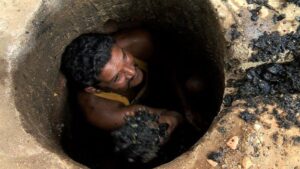Some of the saddest news in India which appears with tragic regularity relates to the deaths of sewer workers caused by occupational hazards. The demand for fixing responsibility and taking strong action against those guilty of negligence has been gaining ground, as also the demand for the prompt compensatory payment as fixed by the Supreme Court.
This is of course important. Isn’t it very sad that the compensation ordered to be paid promptly by the Supreme Court in the case of a sewer worker death related to occupational accident still hasn’t reach many affected households? A prompt payment would have helped so many people facing severe difficulties and distress. After all this is the easier part of what needs to be done.
However to place matters in perspective, while the issue of accidents is certainly the most important one, this is by no means the only serious issue. In terms of exposure to health hazards in the course of routine daily work also there are very serious problems . If all the health costs of all the hazards faced by sewage workers in routine daily work are considered, then these also have a very important adverse impact on the life of sewer workers and their family members.
Hence the wider urgent task is that of initiating more systemic efforts which can minimize all serious safety and health hazards. This demands substantial investment in appropriate technology and equipment, as well as in training based on this. When safety issues are highlighted, one response is to hastily purchase whatever equipment happens to be available , even though this may not prove very useful. This way we will not advance much even after spending more. We need to give adequate attention to evolving technology and equipments which are suitable in working conditions that prevail in India.
Who can advice best on this than the workers, including more senior workers and supervisors who have so much close and day-to-day experience of the kind of problems that exist. The most expensive and the biggest machines available in the market are not necessarily the most effective. What works best in western countries is not necessarily the best solution in India.
Let us be clear regarding our needs. Our need is to ensure safety. Our need is to minimize health hazards. Our need is go for lower costs without sacrificing effectiveness so that safety and health protection can spread all over the country in affordable practical ways. If the equipment can be fabricated locally in smaller scale units all the better in terms of generating local jobs .
Sometimes to improve safety and reduce risks we also need adequate number of workers to follow the proper safety procedures. We should not sacrifice jobs unnecessarily and there should be an effort to avoid any retrenchments in the course of introducing new technology. So we should involve workers including senior and retired ones and supervisors to work more broadly on technology, design, innovation, manufacture, training , while making available adequate funds.
Budget should not be a constraint, but the practical aspects of technology which can spread more easily to a wider area should be kept in mind.
There are other aspects of sanitation and sewage which badly need improvement , and ultimately over-centralized expensive models must yield place to local decentralized models. This is needed for successful low-cost sanitation solutions as well as for the wider objectives of checking pollution of rivers and streams. Various sanitation and water solutions should not be considered in isolation but instead these should be integrated as these solutions at various levels are inter-related to each other.
Is the safety of worker issue so separated from the issue of more decentralized sanitation models. It is not , but different people and projects work on different kinds of solutions and these are not integrated, at least to the extent needed.
In addition the technical issues need integration with social issues as well. Yes, the bigger priority is that we need to minimize safety and health hazards, but the issue of social dignity of sewage works is also so important and needs a lot of attention and effort.
Bharat Dogra is a journalist and author who has been writing on public interest issues for over four decades.

